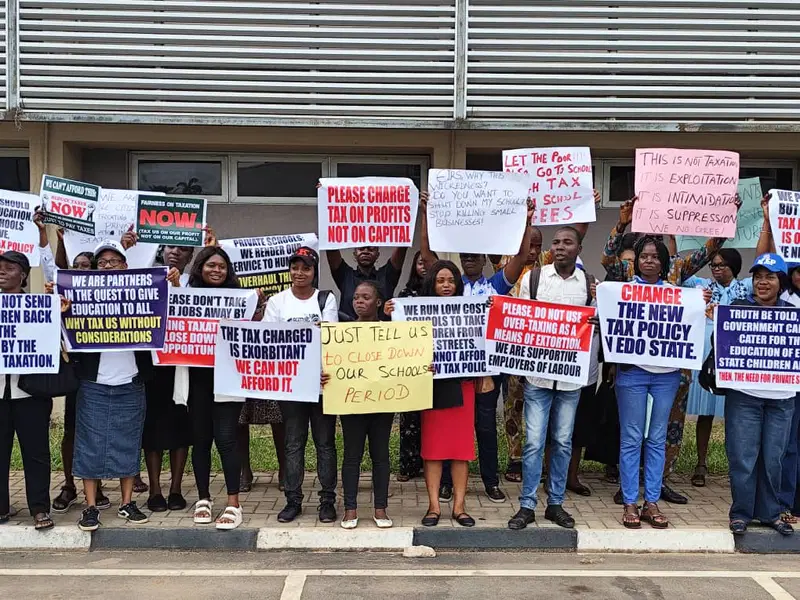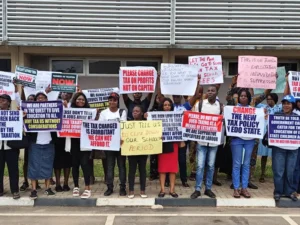Tony Elumelu, Chairman of United Bank for Africa, recently urged President Bola Tinubu to prioritize security to address food scarcity and attract investment .He emphasized that security is crucial for protecting citizens, ensuring they can farm and conduct business without fear. Elumelu’s appeal aligns with President Tinubu’s own commitment to overhaul the nation’s internal security architecture to enhance law enforcement capabilities and safeguard lives, property, and investments across the country .
Tony Elumelu praised the banking sector, calling it a “cornerstone of Nigeria’s economy” and highlighting its transformation over the past few decades as one of the country’s success stories. He emphasized the sector’s significant contributions, including:
· Employing millions of people
· Providing crucial financial support to numerous businesses
· Generating income for millions of shareholders
Elumelu’s comments acknowledge the banking sector’s vital role in driving economic growth, supporting entrepreneurship, and creating wealth in Nigeria. His recognition of the sector’s achievements and importance underscores the need for continued support and development to ensure its sustained contribution to the nation’s economy.
To address the challenges facing the banking sector, Tony Elumelu emphasized the need for constructive dialogue and collaboration among stakeholders, including government agencies, regulatory bodies, and banking institutions. He believes that by working together, they can build a more resilient banking sector that drives economic growth and supports the aspirations of Nigerians.
President Bola Tinubu, represented by Vice President Kashim Shettima, echoed this sentiment in his message to the conference. He urged the business and banking community to focus on capacity building, talent development, and youth empowerment as key drivers of Nigeria’s economic growth. The President’s administration has made growing the economy a top priority, and he encouraged stakeholders to work together to achieve this goal.To reduce inflation, the Nigerian government can implement policies such as :
· Monetary policy: Higher interest rates reduce demand in the economy, leading to lower economic growth and lower inflation.
· Supply-side policies: Policies to increase the competitiveness and efficiency of the economy, putting downward pressure on long-term costs.
· Fiscal policy: A higher rate of income tax could reduce spending, demand and inflationary pressures.
· Wage/price controls: Trying to control wages and prices could help to reduce inflationary pressures.
· Exchange rate policy: A country may seek to keep inflation low by joining a fixed exchange rate mechanism.
· Reducing expectations: A key determinant of inflation over time is inflation expectations. If people expect inflation next year, firms will put up prices and workers will demand higher wages.
· Price controls: With inflation, we will see firms trying to increase prices as much as they can to maintain profitability and deal with rising costs.
· Wage control: If inflation is caused by wage inflation, then limiting wage growth can help to moderate inflation.
· Monetarism: Monetarism seeks to control inflation by controlling the money supply.
· Targeting money supply: In the early 1980s, the UK adopted a form of monetarism, where the government sought to control inflation by controlling the money supply.
The President said his policies would restore confidence in the economy and that measures being taken would reduce inflation, stabilize the foreign exchange market and improve fiscal management.
“Our focus is on strengthening infrastructure development. “We are reducing transportation costs and improving market access by investing in infrastructure that supports economic growth,” he said.
He further stressed the importance of financial inclusion, noting that formal financial inclusion in Nigeria grew from 56% in 2020 to 64% in 2023.
The President added: “This progress has been driven by increased bank access and advancements in non-bank areas, such as mobile money services.”
Minister of Finance Wale Edun discussed fiscal policies, announcing plans to:
- Increase premium motor spirit (PMS) supply by 25 million liters starting in September through the Dangote refinery, aiming to alleviate transportation costs.
- Enhance procurement of biofuel buses and compressed natural gas (CNG) conversion kits.
Edun acknowledged the ongoing challenge of food inflation, noting:
- The consumer price index (CPI) decreased from 34% in June to 33% in July.
- Food prices continue to rise sharply, despite the slight easing of CPI.
The minister’s announcements aim to address transportation costs and food inflation, two significant factors impacting Nigeria’s economy and citizens’ lives.
The Governor of the Central Bank of Nigeria (CBN), Olayemi Cardoso, emphasized the crucial role of bankers in driving inclusive growth, describing them as:
· “Critical stakeholders”
· “Track drivers of inclusive growth”
He highlighted the significant impact of bankers’ decisions and actions on the lives of:
· Millions of Nigerians
· Africans as a whole
Cardoso’s message, delivered by Dr. Braise Ijebor, Director of Risk Management, underscores the importance of bankers’ responsibilities and the far-reaching consequences of their actions on the economy and society.





















